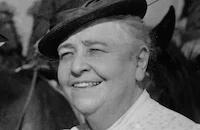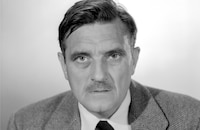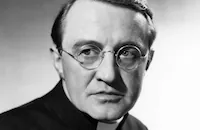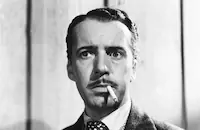The Loves of Edgar Allan Poe
Brief Synopsis
Cast & Crew
Harry Lachman
Linda Darnell
John Shepperd
Virginia Gilmore
Jane Darwell
Mary Howard
Film Details
Technical Specs

Synopsis
In 1811, a penniless actress dies in Richmond, Virginia after a long illness, and her young son, Edgar Poe, is taken in by the beautiful, childless Frances Allan. Frances is delighted with her foster son, who is renamed Edgar Allan Poe, but her husband, rich merchant John Allan, becomes jealous of the attention Frances lavishes on Edgar. Time does not improve Poe and Allan's relationship, but the boy's devotion to his foster mother never wavers, even at age twelve when he falls in love with a schoolmate, Elmira Royster. Years later, on the eve of Poe's departure for the University of Virginia, Poe and Elmira declare their love for each other. At the same time, however, Allan tells Elmira's father that he has no intention of making Poe his legal heir, prompting Mr. Royster to forbid Elmira's marriage to Poe. At the university, Poe spends his days writing, drinking and gambling and soon is in debt. Thomas Jefferson, the university president and former U.S. President, tries to encourage Poe and counsels him to be diplomatic with Allan, who wants Poe to stop wasting his time on literature. Poe confronts Allan, who refuses to cover his debts or continue paying his tuition unless he studies law. Poe refuses, and after discovering that Elmira is engaged to another man, leaves Richmond. He publishes his first book of poetry, but finally, hungry and bitter, joins the army and persuades Allan to get him an appointment to West Point. Poe fails there as well, however, and goes to Baltimore to visit his father's sister, Mariah Clemm. There Poe meets his shy, naïve cousin Virginia and falls in love with her. More of his poems are published, leading to two job offers to edit literary magazines. Poe chooses the job located in Richmond to prove to Allan and Elmira that he does not need them anymore. Frances dies before Poe can return, however, and heartbroken, he devotes himself to Virginia, whom he marries, and to changing copyright laws to protect authors. At a ball one evening, Poe encounters Elmira, who tells him that her father left her no choice but to marry someone else. Later, Poe's drinking increases, and after one of his frequent binges, he quits his job when the magazine owner, T. W. White, castigates him for neglecting his work. Poe then takes Virginia and Mariah to Philadelphia, where he becomes the editor of another magazine, and at first they are very content, especially when Charles Dickens visits the magazine's office and praises Poe's writings. Soon, however, Poe's persistence in fighting the copyright laws and in drinking result in the loss of his job. Virginia loves him nonetheless and encourages him to keep writing. Poe becomes frantic when Virginia's health fails, for they have no money for medicine, and takes his latest poem, "The Raven," to Mr. Griswold of the Broadway Journal . Griswold refuses to buy it though, after a group of printers listen to a reading of it and do not like it. The printers nevertheless raise some money with which Poe buys food for Virginia, but it is too late and she dies. After her death, Poe sinks deeper into despair and becomes a complete drunkard. He finally collapses and is taken to a Baltimore hospital, where he dies while speaking of Virginia.

Director
Harry Lachman
Cast

Linda Darnell

John Shepperd

Virginia Gilmore

Jane Darwell

Mary Howard

Frank Conroy

Henry Morgan

Walter Kingsford

Morris Ankrum
Skippy Wanders

Freddie Mercer
Erville Alderson
Peggy Mcintyre
William Bakewell
Frank Melton
Morton Lowry

Gilbert Emery
Ed Stanley
Francis Ford
Harry Denny

Hardie Albright
Jan Clayton

Mae Marsh
George Harris
Sonny Bupp
Leon Tyler
George Reed
Stanley Logan
Margaret Fielding
Charlotte Treadway
Ralph Mccullough
Alec Craig
Howard Lane
Otto Hoffman

Arthur Shields

Boyd Irwin
Crew
Fred Allen
Lucien Andriot
Jasper Blystone
Harry Brand
Arthur Caesar
Richard Day
Bryan Foy
Eugene Grossman
Samuel Hoffenstein
Nathan Juran
Robert E. Kent
Harry M. Leonard
Thomas Little
Emil Newman
Tom Reed
Dolly Tree

Film Details
Technical Specs

Quotes
Trivia
Notes
The working titles of this film were Edgar Allan Poe, The Man Who Walked Alone and The Romance of Annabel Lee. The picture is loosely based on the life of Edgar Allan Poe (19 January 1809-7 October 1849), who was raised as the foster child of John and Frances Allan after the death of his parents. As depicted in the film, Poe's troubled life was marked by an early romance with Elmira Royster, failed attempts to study at the University of Virginia and West Point, marriage to his teenaged cousin, Virginia Clemm and health and work problems caused by alcoholism. Poe edited a number of magazines and was an advocate of establishing international copyright laws. As the Variety review pointed out, however, "there have been a number of liberties taken with the true story of Poe's life," including the episode in which Poe cannot sell "The Raven," which was actually published to much acclaim during his lifetime.
According to information in the Twentieth Century-Fox Produced Scripts Collection, located at the UCLA Arts-Special Collections Library, the original screenplay was first owned by Warner Bros. The earliest Warner Bros. script in the collection, dated August 9, 1939, is titled Edgar Allen Poe or The Man Who Walked Alone and was written by Robert E. Kent and Tom Reed. On some of the Warner Bros. scripts, Edgar Allan Poe, Jr. and Finlay McDermid are listed as technical advisors. According to a Hollywood Reporter news item, Poe, Jr. was a "remote relation of the early American writer," but the extent of his and McDermid's contribution to the finished film has not been determined. Hollywood Reporter news items from 1939 noted that Claude Rains, John Garfield and Franchot Tone were being considered for the lead role, while a 1940 Los Angeles Times item reported that Louis Hayward was going to be tested. Lew Seiler was set to direct the picture, with Bryan Foy producing, and both Crane Wilbur and credited writer Tom Reed were listed as the screenwriters. The extent of Wilbur's contribution to the completed film has not been determined, however.
Twentieth Century-Fox purchased the script in early 1942, after Foy moved from Warner Bros. to Fox. This was his first production for Fox. According to Hollywood Reporter news items, Irving Pichel was originally set as the director, but was replaced after being called upon to direct The Pied Piper (see below). Another Hollywood Reporter news item stated that the set used in the 1942 Fox film Ten Gentlemen from West Point was to be employed in scenes showing Poe at West Point, but no shots of him at that institution appear in the finished film. Hollywood Reporter also reported that Foy sent a camera crew to get background shots of West Point, Philadelphia and the University of Virginia for the picture.
Many films based on Poe's works have been produced. Films based on Poe's own life include the 1909 Biograph picture Edgar Allen Poe, directed by D. W. Griffith; the 1915 Essanay production entitled The Raven, which was directed by Charles J. Brabin and starred Henry B. Walthall (see AFI Catalog of Feature Films, 1911-20; F1.3642); The Man with a Cloak, a 1951 M-G-M release directed by Fletcher Markle and starring Joseph Cotten; and Cintel Production's 1973 The Spectre of Edgar Allan Poe, which was directed by Mohy Quandour and starred Robert Walker.












